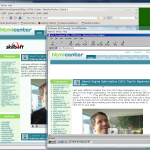 I am probably quite late to the party, but I discovered Sun’s VirtualBox a few weeks ago, and have been extremely impressed. In the short time I’ve had VirtualBox installed, I have already installed two operating systems that I was never able to successfully install on Microsoft’s VirtualMachine.
I am probably quite late to the party, but I discovered Sun’s VirtualBox a few weeks ago, and have been extremely impressed. In the short time I’ve had VirtualBox installed, I have already installed two operating systems that I was never able to successfully install on Microsoft’s VirtualMachine.
With my Vista Home install as the host system, I am now running Windows 98SE and SuSE (11.0) as guests on my computer. I will most likely install Windows XP Professional fairly soon, as well; though I will have to see what I can do with the licensing, since I also want to run some fairly modern version of Windows as a guest on my SuSE machine.
With Microsoft VM, I was never able to get Win98 installed properly (it always froze when I was trying to install), nor was I able to get any distros of Linux running through VM.
In addition, at least for me, VirtualBox has been running faster than VM ever did for me (it’s possible that has to do with different configurations, though).
 For anyone that wants to try running multiple operating systems on their computers, Sun’s VirtualBox is a very good way to do that. With VirtualBox, there is no need to reboot or dualboot in order to have more than one operating system. Instead, you simply run one operating system as the host. Then, you can run an inordinate amount of guest systems through VirtualBox. If you wanted to (although performance would probably suffer terribly), you could probably even run three or four operating systems all at once using VirtualBox.
For anyone that wants to try running multiple operating systems on their computers, Sun’s VirtualBox is a very good way to do that. With VirtualBox, there is no need to reboot or dualboot in order to have more than one operating system. Instead, you simply run one operating system as the host. Then, you can run an inordinate amount of guest systems through VirtualBox. If you wanted to (although performance would probably suffer terribly), you could probably even run three or four operating systems all at once using VirtualBox.
In fact, the screen shot to the right shows me running Windows 98SE and SuSE 11.0 inside of Vista with very little performance degradation.
On top of the fact that VirtualBox seems capable of running (and optimizing) multiple operating systems that are completely unavailable through VirtualMachine, VirtualBox is available for Windows, Mac OS and Linux, so you’re not confined to using VM on strictly Windows boxes.
Post Your Comment